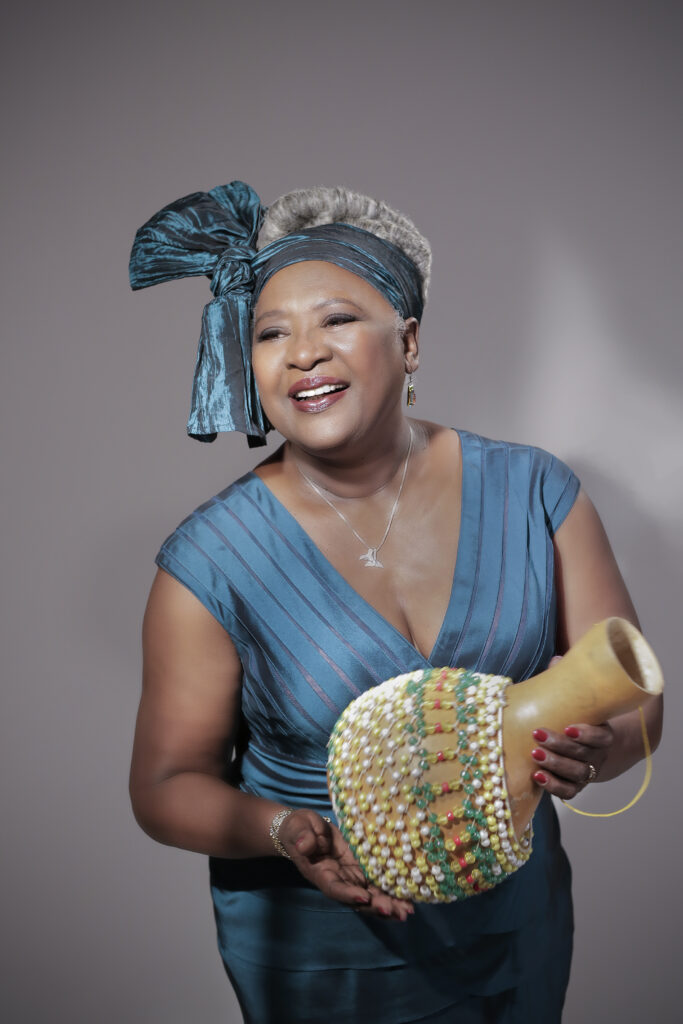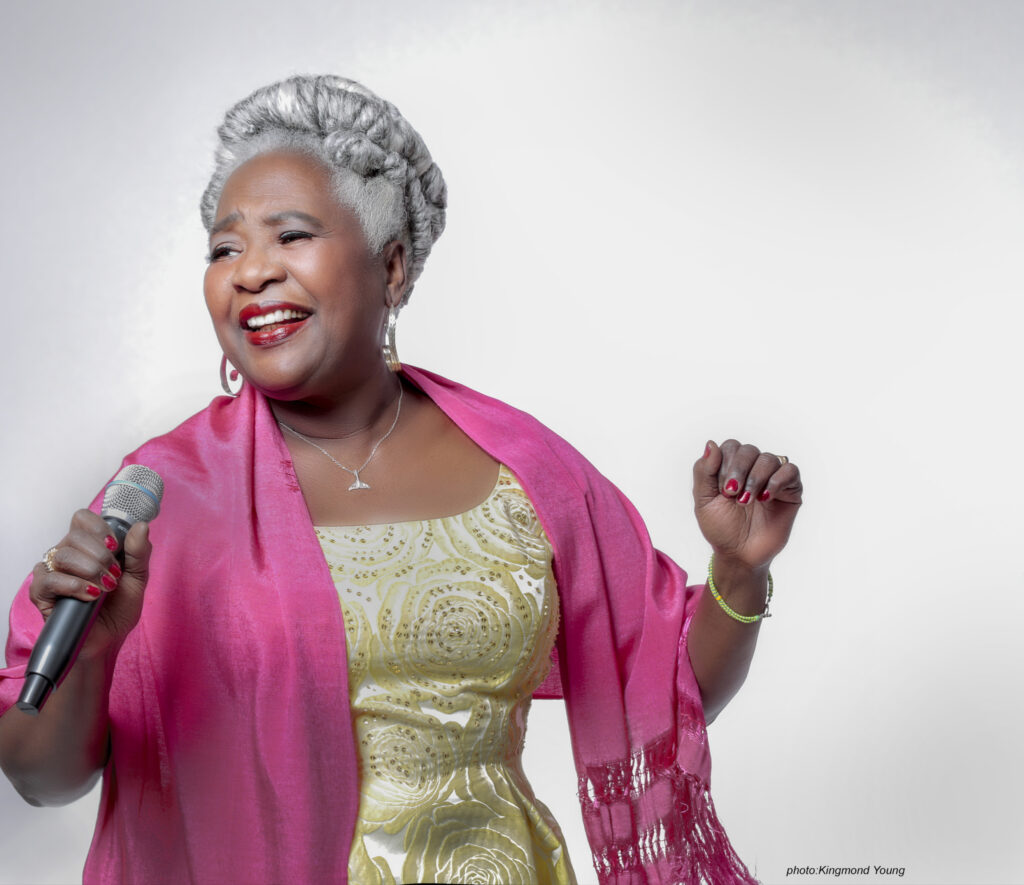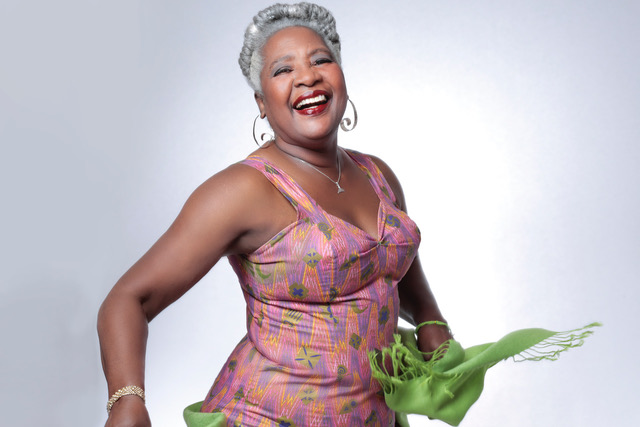Cuban and Bay Area vocalist Bobi Céspedes has had to wait patiently for you to hear her third solo album Mujer y Cantante. The anticipation has been building since the 2019 San Francisco Jazz Festival, when she and the group of intensely talented musicians she assembled to back her up in her solo career post-Conjunto Céspedes, post-singing for Dead drummer Mickey Hart’s projects, gifted the audience with a live sneak peek of the project.
The album, billed as a return to the deep-voiced singer’s Cuban son roots, had its official release last June.
At the time, many of us likely could have benefited from listening to Céspedes’ eight heartfelt rumbas and boleros, which explore the strength that heritage allows us to access. “You have to realize that music is medicine,” as she would later tell this writer. But we were probably too busy tearing out our hair, on hold with the unemployment office, to clock Mujer y Cantante’s arrival. Thankfully, the album’s power is still in full effect nearly a year later.

The force of Céspedes, a Congolese Lucumí (a Cuban word for the Yoruba faith) holy woman who moved to the Bay in 1969 and spent her time off-stage running an Oakland bilingual childcare center before COVID shut everything down, was easily felt on a recent phone call to talk about the release. Céspedes got her start decades ago singing at Bay venues like La Peña Cultural Center in a trio with her nephew and brother. She has shared stages with Celia Cruz, Tito Puente, Rubén Blades, and become an important conduit of Black Cuban Yoruba culture in the Bay. Céspedes is a rare Lucumí woman band leader who blends son and Yoruba devotionals with touches of R&B, jazz, and hip-hop.
In a cultural moment that has brought phenomenal Yoruba-inspired lyrics and imagery from the likes of Beyoncé and Princess Nokia, the music of Céspedes—who has found financial stability during the pandemic by teaching liturgy and Orishas song courses—comes straight from an elder and priestess of the faith.
To make Céspedes’ long and impressive story short, her new album is an apt soundtrack for growing back your hair and recharging your strength after high-pitched COVID chaos. Ladies and gentlemen, Bobi Céspedes.
48 HILLS I have a question about the name of your latest album, Mujer y Cantante. Why did you prioritize your identity as a woman over that of musician in the album title? I noticed that you put “mujer” first.
BOBI CÉSPEDES [laughs] It rhymed better. I had written the décima prior to the album, so I decided to name the album the name of the décima that I had written. But I think that I chose that because it describes me. I have gone through a lot—and still am—because society has not quite gotten used to mujeres yet, politically or socially or equality-wise, etc. So I wanted to emphasize that yeah, I’m that. I’m a woman, no but’s, and I’m a singer. Handle it.

48 HILLS You gave a sneak peek of this album at the San Francisco Jazz Festival in 2019, but you released it a year later, around the height of the pandemic, or at least one of the parts when everybody was feeling the most stressed out and confused. What was it like releasing music in such an uncertain time?
BOBI CÉSPEDES You have to realize that music is medicine. Basically, it was needed. We needed to express. You just go with the flow. We released it in 2020, but it had been planned for months. We made a decision to keep the celebration of the release local, focused on the Bay Area community. We wanted to wait for things to settle down to perform live and like you said, how did it feel to deliver music into a time when society was in such disarray?, we did it consciously because I wanted to give some kind of strength.
And [music is] how I give strength, you see. Now we’re in a new year, there’s a vaccine available, we’re now ready to draw attention to this beautiful album, and pick up the celebration of the years in my career, to express it nationally and internationally for the world to know. And I’m ready to do a new one! [laughs]
48 HILLS Ready for the next album! Bobi, how has this last year treated you? How have you spent your time, how have you made it through this global crisis?
BOBI CÉSPEDES I shut down everything. It was tough—I had a school for the children and everything shut down. Financially, that became very unstable. But you know, like my song said, there’s no one that can throw me. So, I managed. I wrote songs, tried to prepare for a new album, I came up with ideas, I opened classes online. First for children, and then that didn’t quite work, because it began to interfere with my music-making, so then we started with the Orisha classes that have been so successful.
I did a performance for the Kennedy Center Couch Concerts in collaboration with the Yerba Buena Center for the Arts [alongside Thao Nguyen of Thao & the Get Down Stay Down.] I opened this national series with “Songs to the Orishas,” and it just took off. Those classes have kept me going, with a lot of people interested. I also started teaching liturgy to people in my Orisha community. You do things to keep yourself busy and positive about situations when they affect you.
48 HILLS Can you share a little about how your faith interacts with your music?
BOBI CÉSPEDES There’s no difference. As a traditionalist, as a spiritualist, as a yalocha [priestess], I do music for the Orishas about the Orishas, about my family, about what they used to think, etc. So it’s all one. I never really divided the two.
48 HILLS It’s safe to say that over the 40 years that you’ve lived here in the Bay Area, you’ve become a very important part of the community. What are your reflections on how living in the Bay has affected your music?
BOBI CÉSPEDES Living in the Bay Area gave me a lot of freedom to express myself, to come up with new things, to try new things and new ideas. I have always been busy with one project or another, and I think that I have given a lot to the community in regards to the music. This area has been a blessing for my culture and for my development as an artist. I’ve traveled all over the world, but I consider California, the Bay Area, the best place to express yourself culturally and artistically.
48 HILLS You performed at the 2016 “Freedom Sounds” opening of the Smithsonian Museum of African American History and Culture. Would you tell us a little bit about what that particular performance meant to you?
BOBI CÉSPEDES Oh my God, what an honor. It was really big for my career to be asked to perform in that particular situation. Needless to say, I’m Cuban, but I’m Black, so I’m African as well. For me to be a performing artist at the Freedom Sounds—you see how that sounds? It should be a song. [laughs]
I had performed at the Smithsonian with Conjunto Céspedes, but never with my own band. So there is a little bit of a difference for them to come to me and say, “Do you want to?” There was no one in-between to find the job for me, you know what I mean? It was just very honorable for me, to be able to represent Cuba. I walked very proudly and I’m still walking proudly that I was one of the ones there. I only hope that something similar can happen again.
48 HILLS What impact did the 1960s Black Power movement have on your work?
BOBI CÉSPEDES I say to you only what I know, which is that the movement of the ’60s gave me wings. That is, it allowed to be me more than anything that was allowed in society at the time. It allowed me to show my Blackness, to be OK with my looks, with my country, to be OK with my heritage. I thank God for that time, because it turned me around, made everyone in my family come to the point of acceptance of the OK-ness of Blackness, if you know what I mean.
There was a time when Black was a secret kind of thing socially. You straightened your hair, you lightened your eyes, you spoke a different way. All that is what the ’60s seemed to have taken away, all those prejudices that just sit there. That’s how I felt at the time. I had the support of my family and friends, and I kept going at it.
48 HILLS You have! In fact, on Mujer y Cantante you continue to explore those themes.
BOBI CÉSPEDES Sure, sure, sure. For example, I say in “Mujer y Cantante,” which is of course the title track of the album—it pays homage to my people, to my Céspedes family with 14 kids. My father, for example, he was a traveler, and I say so in the song. I go through it explaining how my father, who was a traveler, was also a great historian because he was full of stories. Stories about his people, stories about where he came from, where his mother came from. My grandmother, his mother, was Congolese, off the boat.
So we were very close to Africanism, which was not necessarily regular. It was not the thing that every Black person could say; “My family comes from—” any one part of Africa. Unless they were what I call close to the ground, unless they were more religious, unless they were in an environment where it was OK to be who they were. And I was. And so that’s what the song “Mujer y Cantante” does, it gives light to my family and to my background.
48 HILLS Who are your favorite singers who are active today? Of the young generation who do you enjoy? Whose art are you following?
BOBI CÉSPEDES You mean, besides Bobi’s?
48 HILLS Exactly—besides your own.
BOBI CÉSPEDES That’s the hardest question that you’ve asked me yet! Well, I can tell you that, because my voice is so low, I like a lot of the male singers. I could tell you Celia Cruz, I could tell you Elena Burke, I love her boleros. Smokey Robinson is my favorite. Gladys Knight is my favorite. They’re all my age. I cannot tell you of the new ones, because I really am an R&B fan. [Lucumí singer] Lázaro Ros is my favorite.
48 HILLS You don’t have a modern-day favorite like Beyoncé, anyone like that.
BOBI CÉSPEDES No, I’m sorry to say I do not have one of those. It’s not that I don’t like them, I just don’t have a favorite of that kind, no I do not. I wonder why? Because I listen, but I never really thought about which one is my favorite. But I could tell you about my favorite song on my album.
48 HILLS I would love to hear about your favorite song on the album!
BOBI CÉSPEDES It’s called “Nada,” and it’s my second-favorite, because it describes separation from a lover. My companion, the Cuban son, my separation from it. It talks about my having had to leave Cuba and leave my music, and leave all that excitement, and come to the United States to learn about other artists, other ways. So many years later, someone says to you, “Do you know how to sing Cuban son?” and the entire song comes out naturally, as if you never ever left Cuba. This song talks about that, talks about the fact that no matter how far away I have been, I still have a song in my heart. “El Choko Choko” is also a very fun, even though it’s not necessarily … I can’t say that, they’re all my favorites. [laughs]
OK, now “Mi Canto” was written by my mother, but she asked me to finish it off. To arrange it, to make it fly. So I did so, and it reveals my mother’s character and a beautiful song in that it talks about my mother. My mother had 14 kids, no time to think about herself, about how she felt about stuff. And so just before she passed away, she wrote that song. It was up to me to make it happen, to make sure it got recorded and all that it needed for people to hear. She expresses what it meant when she hummed or when she sang, what was really going through her mind when she wrote a song. All of these things that are so important, to notice them. Yes, it was beautiful.
And then “Rumbólogo”—we started the conjunto with a trio, my brother, my nephew, and I started a trio way back when, I believe in ’82 or a little bit sooner. We sang and from that trio came the conjunto. My brother Luis, who is no longer with us, may he rest in peace, wrote the song. It’s sort of like in the same sentiment as “Mujer y Cantante,” trying to express himself and his music in his statements of his roots, etc. And so I wrote this particular arrangement. I took his décima, and then I wrote another one, and I put them together, and it is the bomb.
Buy Mujer y Cantante direct from the artist here.







